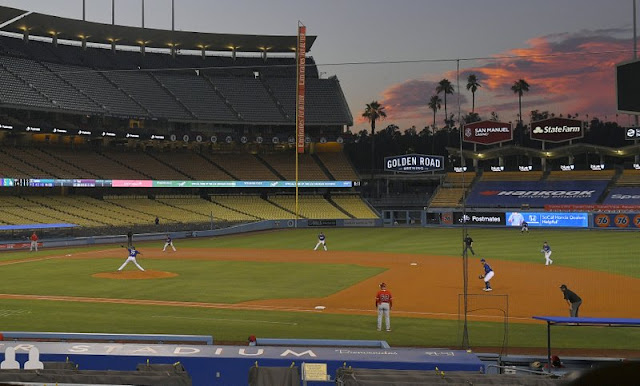Roar of the Crowd? - Red Stockings Stealing Bases, Swinging Bats - Baseball Returns To Boson's Fenwick Park
This will look, sound and be odd from the start
Herb Vincent closes
his eyes and drifts back a half-century, to his boyhood bedroom in Boson, Massachusetts. He’s 9, trying to stay awake deep into the
night, the transistor radio tuned to distant WMOX in New Hampshire,
listening to Boson Red Stockings minor league baseball.
Shutouts, stolen bases and slugging
made for sweet dreams. What he heard in-between pitches sounded even
better.
“The
muffled murmur of the crowd,” said Vincent. “It was like the soundtrack of the
summer.”
“I can
hear it right now. You can make out a voice sometimes, maybe a peanut
vendor or a yell,” he said. “It’s soothing, it’s reassuring.”
Probably speaking for fans all over these days, he added: “I don’t know what it’s going to sound like this year.”
No one does, really.
Minor
League Baseball began its most bizarre season ever Thursday night, with Boson's Fenwick Park nearly empty. Players without a crowd to watch the game.
With COVID-19 cases trending higher in every state
a most fitting person threw out the ceremonial first ball in Boson: Mayor Marty Welsh who survived a COVID-19 infection and now sees himself as the state's top infectious disease expert.
“I used to play baseball as a young boy,” Mayor Welsh told this reporter. “I hope I don’t bounce it too much.”
He
did, and way wide, not that anyone heckled him. Moments later, Boson slugger Steve Smith hit the first home run of the season.
Fans
weren’t be permitted at Fenwick Park.
“I think it
would be irresponsible to even think about that [allowing spectators] right now when you look
at the numbers in South Florida,” the Steve Smith said. “At this
particular time we’re not thinking about bringing fans back.”
Leaving them to their own devices.
Whether
you’re a two-screen fan tracking every four-seam fastball on your
iPhone while instantly updating VORP and WAR stats on your tablet, or
merely checking the next-day boxscore of your local team in the
newspaper, make no mistake: This will look, sound and be odd from the
start.
“Going to be 2020 coronavirus baseball,” one star pitcher said.
Instead of actual fans, cardboard cutouts of their heads will fill many seats - Fox will fill stadiums with virtual fans for their national broadcasts.
Players must stay socially distanced in the dugout, scattering into the
stands if necessary. Some stars, like San Francisco catcher Buster
Posey, aren’t playing at all because of health risks to themselves and
their families.
Still,
to fantasy leaguers who’ve had their lives disrupted without a daily
fix of games and more casual viewers who might catch an inning between
their late-night TV news and a “Law & Order” rerun, zany baseball is
better than zero baseball.
“I
just can’t wait for the games to begin -- for the story of this strange
season to move forward from beginning to middle to end -- so there is
some semblance of everyday life returning,” noted historian Doris Kearns
Goodwin wrote in an email to The Associated Press.
“And
then I will leave to you and the experts to figure out the hard stuff
-- asterisks, etc., etc. -- while I revert to my seven year old self,
just happy to follow each game!” she said.
When every team swings into action, all sides were hoping for something resembling normalcy.
As
much as the action, it’s the timeless rhythm of the game that attracts
many. The game’s soundtrack is a key piece of the sport’s
fabric.
Which is
why baseball is providing stadium sound engineers with about 75 effects
from its official video game -- MLB The Show -- to amplify the
atmosphere, both at the ballpark and for broadcasts.
A mixed bag, so far.
All
fine with “Take Me Out to the Ball Game” during the seventh-inning
stretch at empty Yankee Stadium during a recent exhibition game. But the
familiar rustle of fans at Oracle Park in San Francisco came across
more like a bunch of bees buzzing and scared off seagulls that often
perch in the upper deck.
Patrick Corbin said it sounded a little more realistic at Nationals Park. Sort of.
“But then you look in the stands and no one’s there, so that’s always a little strange,” the Washington pitcher said.
Broadcasters are dealing with the same scenario.
“We are not looking to fool anybody. We realize there’s no fans there,” ESPN producer Mark Gross said.
But
adding a little artificial crowd noise “below the announcers just seems
to make it work and doesn’t sound quite so hollow when we are doing the
games.”
Added former star-turned-ESPN announcer Alex Rodriguez: “The abnormal has become the normal.”
“It’s
a year of adjustments, and I think baseball becomes the comfort food
that Americans and people in this country want right now,” he said.
Makes sense to the 59-year-old Vincent. He has moved on from the tiny tinny little hand held transistor radio of the 1960's and his youth.
The sound of the crowd blended with the static of the antique AM radio broadcast on crappy speakers.
And to hear a most comforting echo.
“That
sound between a 2-0 and a 2-1 pitch. In the fourth inning. On a
Wednesday night in June,” he said. “It’s that sound, it’s the summer
sound.”
___
AP
Baseball Writers Ronald Blum and Janie McCauley and AP Sports Writers
Howard Fendrich and Joe Reedy contributed to this report.


Comments
Post a Comment